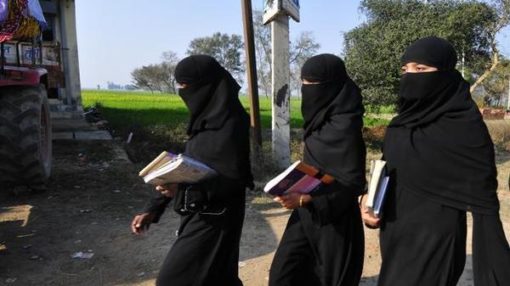
The Muslim Educational Society (MES) in Kozhikode has issued a circular barring Muslim women from wearing face veils in educational institutions. The MES is a non-governmental organisation which runs over 35 colleges and 75 schools.
The new circular, undersigned by the current president of MES, Fazal Gafoor, was sent to all heads of the institutions controlled by them. The letter stated “no MES institutions will allow its students to wear religious veil. The institutional heads and the school/college managements are henceforth, requested to be vigilant and follow the rules.”
The circular has been issued a month before the new academic session is set to commence. Speaking to Asianet News, Gafoor said, “MES institutions stand for renaissance. Our vision was always in favour of women and has always stood for women’s welfare. We have fought for their educational rights, for jobs, for political representations etc.” Presently more than one lakh students are admitted to various MES institutions and 65 percent of it is women.
The new decision by the MES management has angered various Muslim organisations including Samastha Kerala Jam’eyyath ul-Ulama, a Sunni Muslim organisation. Samastha has accused MES of breaching an individual’s religious practices. Reacting to these issues Gafoor added, “There is an ideological difference between all these organisations. However, we have never interfered in the rules and regulations other schools/organisations impose upon their students and followers. As an educational organisation we have the right to make our own rules.”
In 2014, Gafoor had openly criticised other organisations for making the veil mandatory for women in public. Muslim Girls and Women’s Movement (MGM) president Khadeeja Nargis has also extended their support to the new rule. “According to Quran, women are asked to dress in a modest way. Further, face veils were never in practice in Kerala. It’s a recently influenced dressing style from the Arab countries.”
Umar Faissi Mukkam, a member of Samasatha, has accused MES of violating an individuals’ religious practice. “The rules written in Quran cannot be changed according to our will,” said Mukkam.
The new circular came out after an order was passed by the Kerala High Court in 2018. Two Muslim women had approached the court demanding their right to wear headscarf and full sleeved shirts to their school.
Justice A Muhamed Mustaque, while passing the order, observed, “I am of the considered view that the petitioners cannot seek imposition of their individual right as against the larger right of the institution. It is for the institution to decide whether the petitioners can be permitted to attend the classes with the headscarf and full sleeve shirt. It is purely within the domain of the institution to decide on the same. The Court cannot even direct the institution to consider such a request.”
“Fundamental Rights are either in nature of the absolute right or relative right. Absolute rights are non-negotiable. Relative rights are always subject to the restriction imposed by the Constitution. The religious rights are relative rights (see Art 25 of the Constitution). In the absence of any restriction placed by the State, the Court need not examine the matter in the light of restriction under the Constitution,” added Justice Mustaque.
As an educational organisation MES has the right to add or improvise the rules and regulations in their schools and colleges. Furthermore, dressing is a matter of personal choice. To quote from the High Court judgement “individual interest must yield to the larger interest.”




